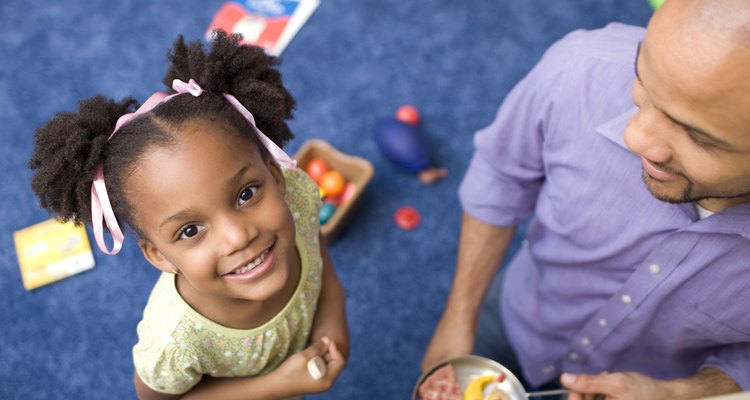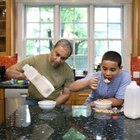
David Sacks/Digital Vision/Getty Images
At a very young age, the symptoms or traits of a narcissistic child fit neatly into the diagnostic criteria for narcissistic personality disorder, or NPD. “The Diagnostic and Statistical Manual of Mental Disorders” lists the criteria for the diagnosis of NPD. There are several symptoms that characterize a narcissistic child.
Grandiosity
The narcissistic child believes she possesses exceptional talents or intellect. In her online article published by “Psychiatric Annals," Karen Kernbery Bardenstein, Ph.D. says the child’s superior view of herself reflects in her haughtiness toward others. She does not view others as important and expresses no empathy or warmth toward them, because of her distorted view. The absence of reciprocity, as in taking turns, supports her inflated self-love. Others’ needs don’t matter to her. Her needs always prove more pressing. She believes the world revolves around her because of her uniqueness. Learning interests her only when she likes the subject matter. When she reaches a boring spot, her mind shuts down or she moves on to something that holds the promise of mastery and praise. Because she cannot tolerate failure, she often abandons a project that won’t make her shine. When she doesn’t receive praise for her endeavors, she opts out and stops trying.
Social Dysfunction
Because he believes in his superiority, the narcissistic child cannot admit when he’s wrong. Author and consultant Linda Martinez-Lewis, Ph.D., says that the narcissistic child refuses to take responsibility for his actions and shows no remorse when he hurts someone’s feelings. He insists on going first in games and bends the rules to suit his needs. His temper will flare if someone tries to beat him at a game and he will quit if he realizes he won’t be the winner. He blames others for his mistakes. He lacks empathy for others. He has no allegiance to friends, but, uses peers for his own desires. When tired of keeping up the pretense of friendship, he turns his back on the person and retreats. Sometimes, he shows open envy of others, while other times he degrades their accomplishments or possessions.
Anti-social Behavior
A narcissist child will stretch the truth or tell an outright lie to get out of trouble. She will not admit she has made a mistake and will even blame others for her shortcomings. Due to her sense of entitlement, she has no qualms about stealing and justifies her action if caught. Commonly, narcissistic children harbor sadistic fantasies in which they have power over others. These themes surface in psychotherapy according to “Psychiatric Annals." Abusive to peers, the narcissist criticizes them and makes unrealistic demands on them. A narcissistic child believes rules don’t apply to her and refuses to adhere to limits placed on her.
Related Articles

Effects of Overbearing Mothers on Their ...

General Characteristics of Emotionally ...

Psychological Effects of Fatherlessness

About Narcissistic Men
How to Deal With Rumors

How Do Overbearing Mothers Affect Men ...

How to Handle an Adult Child Who Blames ...

Effects of Verbal & Emotional Abuse in ...

How to Tell He's Insecure

Confidence-Building Games

What Causes People to Commit Adultery?

What Are Signs of Selfishness?

What Is a Harmful Relationship?

How Does an Overbearing Mother Affect a ...

How to Deal With a Spoiled Adult

Behavior Children Will Show After Being ...

List of Human Characteristics of ...
What is Emotional Abuse?

Signs of a Pervert

How to Talk to a Man With Low ...
References
- "Diagnostic and Statistical Manual of Mental Disorders, Fourth Edition"
Writer Bio
Vita Ruvolo-Wilkes was first published in 1977. She worked as a certified aerobics and exercise instructor. Upon graduating from the Wake Forest University School of Medicine, she worked for the VA Medical Center. As a physician assistant, Ruvolo-Wilkes designed specialized diets for her patients' conditions and has written a monthly health column in the "Montford Newsletter."
Photo Credits
David Sacks/Digital Vision/Getty Images